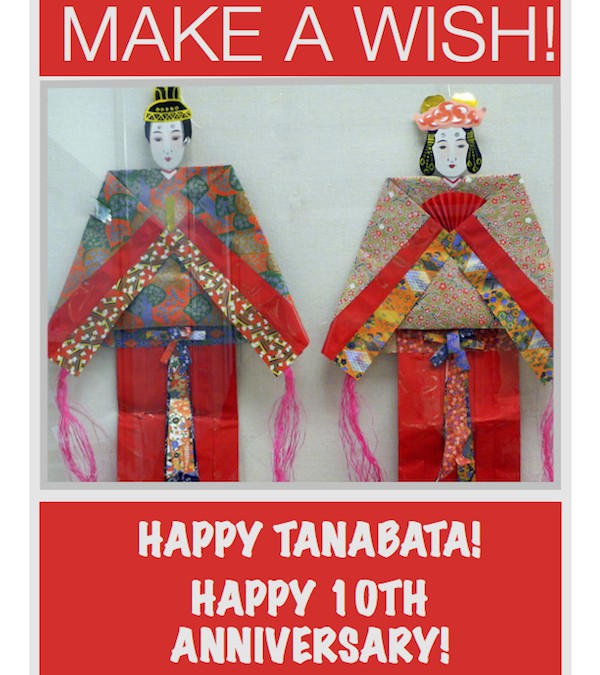Today, July 7, 2014 we celebrate the 10th anniversary of the opening of CRS! Along the way, we have met and worked with so many amazing people and learned so many things we never even imagined when we started. CRS is first and foremost a community center and we have created, shared and extended the center as a community. So we’d like to thank all of you for sharing and for making it possible to share healing in a beautiful space in the middle of Manhattan. That in itself is a miracle!
July 7 is also Tanabata Day, a very old holiday in Japan and China.
Tanabata (meaning “evening of the seventh”) is a Japanese star festival, originating from the Chinese Qixi Festival. It celebrates the meeting of the deities Orihime and Hikoboshi (represented by the stars Vega and Altair respectively) lovers who are separated by the Milky Way and are allowed to meet only once a year on the seventh day of the seventh lunar month. Orihime (織姫 Weaving Princess), daughter of the Tentei (天帝 Sky King), wove beautiful clothes by the bank of the Amanogawa (天の川 Milky Way, lit. “heavenly river”). Her father loved the cloth that she wove and so she worked very hard every day to weave it. However, Orihime was sad that because of her hard work she could never meet and fall in love with anyone.
Concerned about his daughter, Tentei arranged for her to meet Hikoboshi (彦星 Cow Herder Star) who lived and worked on the other side of the Amanogawa. When the two met, they fell instantly in love with each other and married shortly thereafter. However, once married, Orihime no longer would weave cloth for Tentei and Hikoboshi allowed his cows to stray all over Heaven. In anger, Tentei separated the two lovers across the Amanogawa and forbade them to meet. Orihime became despondent at the loss of her husband and asked her father to let them meet again. Tentei was moved by his daughter’s tears and allowed the two to meet on the 7th day of the 7th month if she worked hard and finished her weaving. The first time they tried to meet, however, they found that they could not cross the river because there was no bridge. Orihime cried so much that a flock of magpies came and promised to make a bridge with their wings so that she could cross the river. It is said that if it rains on Tanabata, the magpies cannot come and the two lovers must wait until another year to meet.
In present-day Japan, people generally celebrate this day by writing wishes, sometimes in the form of poetry, on tanzaku, small pieces of paper, and hanging them on bamboo. The bamboo and decorations are often set afloat on a river or burned after the festival, around midnight or on the next day. This resembles the custom of floating paper ships and candles on rivers during Obon. There is also a traditional Tanabata song:
The bamboo leaves rustle,
shaking away in the eaves.
The stars twinkle
on the gold and silver grains of sand.
The five-colour paper strips
I have already written.
The stars twinkle,
they watch us from heaven.
— from Wikipedia

